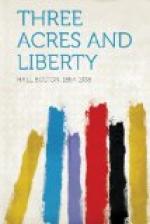“He seemed a little surprised, but accompanied me cheerfully enough as I turned from the road and plunged through the gorse and the trees towards Parliament Fields, until we came upon a large expanse of allotments, carved out of the great playground, and alive with figures, men, women, and children, some earthing up potatoes, some weeding onion beds, some thinning out carrots, some merely walking along the patches, and looking at the fruits of their labor springing from the soil. ‘There,’ I said, ’is the most important result of the war.’
“He laughed, but not contemptuously. He knew what I meant, and I think he more than half agreed.
“And I think you will agree, too, if you will think what that stretch of allotments means. It is the symptom of the most important revival, the greatest spiritual awakening this country has seen for generations. Wherever you go, that symptom meets you. Here in Hampstead allotments are as plentiful as blackberries in autumn. A friend of mine who lives in Beckenham tells me there are fifteen hundred in his parish. In the neighborhood of London there must be many thousands. In the country as a whole there must be hundreds of thousands. If dear old Joseph Fels could revisit the glimpses of the moon and see what is happening, see the vacant lots and waste spaces bursting into onion beds and potato patches, what joy would be his! He was the forerunner of the revival, the passionate pilgrim of the Vacant Lot: but his hot gospel fell on deaf ears, and he died just before the trumpet of war awakened the sleeper.
“Do not suppose that the greatness of this thing that is happening can be measured in terms of food. That is important, no doubt, but it is not the most important thing. I am confident that it will add more than anything else to the spiritual resources of the nation. It is the beginning of a war on the disease that is blighting our people. What is wrong with us? What is the root of our social and spiritual ailment? Is it not the divorce of the people from the soil? For generations the wholesome red blood of the country has been sucked into the great towns, and we have built up a vast machine of industry that has made slaves of us, shut out the light of the fields from our lives, left our children to grow like weeds in the slums, rootless and waterless, poisoned the healthy instincts of nature implanted in us, and put in their place the rank growths of the streets. Can you walk through a working-class district or a Lancashire cotton town, with their huddle of airless streets, without a feeling of despair coming over you at the sense of this enormous perversion of life into the arid channels of death? Can you take pride in an Empire on which the sun never sets when you think of the courts in which, as Will Crooks says, the sun never rises?




